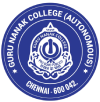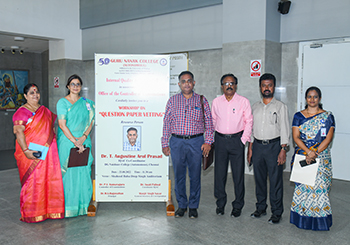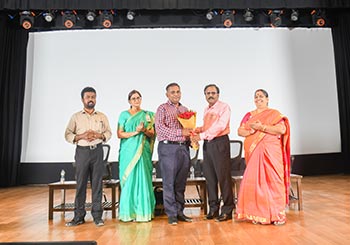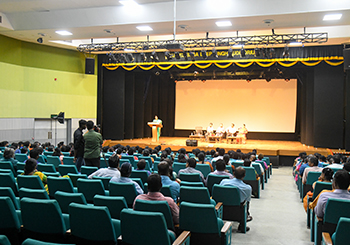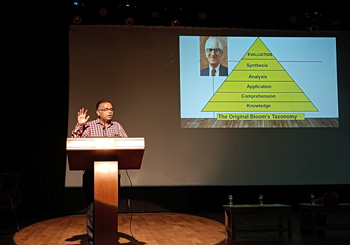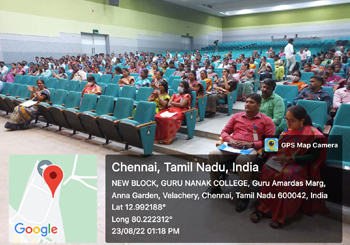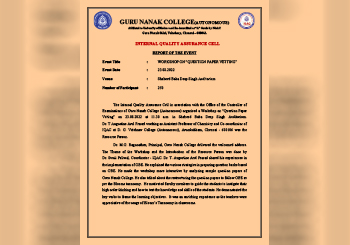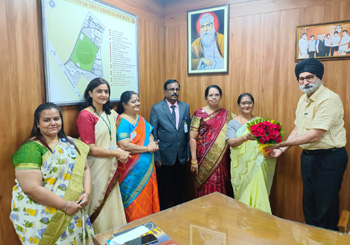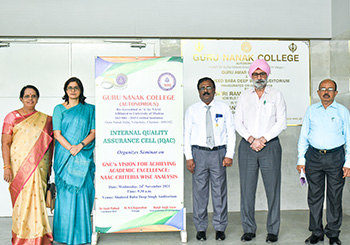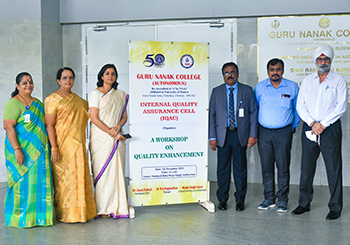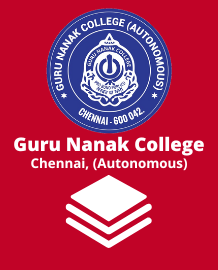Internal Quality Assurance Cell
Internal Academic Audit
Date: 13th – 15th September, 2023
Download PDFWorkshop on e-Goernance
Date: November 2, 2023
Resource Person: Ms.Rajaselvi D, Director, Apple Web Technology Services.
Number of Participants/ Beneficiaries: 259
Download PDFOrientation Programme for the Newly Recruited Faculty Members
Date: August 21-23, 2023
Resource Person: Dr. Marlene Morais, Advisor, Guru Nanak College (Autonomous)
Number of Participants/ Beneficiaries: 40
Download PDFNational Conference on Implementation of National Education Policy 2020 in Higher Education Institutions: Challenges and Strategies
Date: 21 & 22 June, 2023
Resource Person: Thiru R. N. Ravi, Honorable Governor of Tamil Nadu
Prof. Saket Kushwaha, Honorable Vice Chancellor, Rajiv Gandhi University, Arunachal Pradesh
Prof. Dr. M. Krishnan, Honorable Vice Chancellor, Central University of Tamil Nadu, Thiruvarur.
Col. (Prof.) Y. S. Siddegowda, Honorable Vice Chairman, Karnataka State Council for Higher Education
Dr. Sony Kuriakose, IQAC Coordinator, Nirmala College, Kerala
Dr. U. Jerinabi, IQAC Coordinator, Avinashilingam Institute for Home Science and Higher Education for Women, Coimbatore
Number of Participants: 351
IIT-M RESEARCH PARK VISIT
Programme: Field Trip
Date: 24.04.2023
Number of Participants: 12
Conclave on Inter-Institutional Academic and Administrative Quality Improvement
Programme: Inter Quality Assurance Cell.
Date: 15.02.2023 to 16.02.2023
Resource Person:
Prof. Manas Pandey, IQAC Coordinator, Veer Bahadur Singh Purvanchal University, Jaunpur, Uttar Pradesh.
Prof. Pradeep Kumar, Professor, Department of Biotechnology, Veer Bahadur Singh Purvanchal University, Jaunpur, Uttar Pradesh.
Prof. Rajnish Bhaskar, Professor, Head- Department of Electrical Engineering, Veer Bahadur Singh Purvanchal University, Jaunpur, Uttar Pradesh.
Dr. Giridhar Mishra, Associate Professor, Department of Physics, Veer Bahadur Singh Purvanchal University, Jaunpur, Uttar Pradesh.
Dr. Ashutosh Singh, Assistant Professor, Senior Assistant Professor, Department of Business Economics, Veer Bahadur Singh Purvanchal University, Jaunpur, Uttar Pradesh.
Dr. Punit Dhawan, Assistant Professor, Department of Physics, Veer Bahadur Singh Purvanchal University, Jaunpur, Uttar Pradesh.
Dr. Alok Kumar Verma, Assistant Professor, Department of Physics, Veer Bahadur Singh Purvanchal University, Jaunpur, Uttar Pradesh.
Dr. Manoj Pandey, Assistant Professor, Department of Applied Psychology, Veer Bahadur Singh Purvanchal University, Jaunpur, Uttar Pradesh
Dr. Sujeet Chaurasia, Assistant Professor, Centre for Nanoscience and Technology, Veer Bahadur Singh Purvanchal University, Jaunpur, Uttar Pradesh
Dr. Dharmendra Singh, Assistant Professor, Institute of Pharmacy, Veer Bahadur Singh Purvanchal University, Jaunpur, Uttar Pradesh
Number of Participants: 241
Faculty Development Programme on Health Wellness
Date: 13.03.2023 to 17.03.2023
Resource Person:
Dr. Sivakumar, Interventional Cardiologist Consultant, Prashanth Hospital
Dr. Rajkanna, Orthopaedic Surgeon, Prashanth Hospital
Dr. Ananthakrishnan, C., Consultant Physician, Internal Medicine, Prashanth Hospital
Dr. S. Balasubramaniam, Neurologist, Prashanth Hospital
Dr. G. Kavitha Saravanan, Gynaec Physiotherapist and Lactation Consultant, Prashanth Hospital
Number of Participants: 50
Orientation Programme for the Newly Recruited Faculty Members
Date: 21.11.2022 to 22.11.2022
Chief Guest:
Dr M G Ragunathan, Principal, Guru Nanak College
Dr. N.C. Rajashree, Vice Principal (Shift II)
Resource Person:
Dr. S. Savithri, Dean Academics
Dr. P. V. Kumaraguru , Controller of Examinations
Mr. Christy Jeyakumar, Dean, Centre for e-Governance
Dr. J. Jayanthi, Dean Research (GNCR)
Dr. A. Jeyaganesan, Director, Physical Education
Dr. R. Anan, Dean Skill Development (GNCSD)
Dr. Bharathi Ravikrishna, Incubation Coordinator (GNCIIES)
Dr. T. Senthil Kumar and Mr. J. Sripathi, Librarian
Dr. Nafisa Jedd, Counsellor
Dr Swati Paliwal, IQAC Coordinator
Mr. Karthikeyan, Office Superintendent (Shift II)
Workshop on "Programme Outcomes and Course Outcomes Attainment"
Date:5 July 2022
Number of Participants/ Beneficiaries: 170




Objectives
- Establish and promote quality sustenance activities.
- Ensure timely, efficient and progressive performance of academic, administrative and financial tasks.
- Cultivate a system that consistently monitors initiatives taken by the various bodies of the institution and encourage improvement in tune with latest developments in the field of education.
- Plan and execute periodic assessment and accreditation of the institution.
- Record and monitor quality measures of the institution by reviewing the annual progress of departments, schools, extension activities and various bodies which come under the institution’s umbrella through internal and external audits.
- Develop an institutional data base and document various activities leading to quality improvement.
- Channel and systematize efforts and measures towards academic excellence.
- Optimize and integrate modern methods of teaching, learning and evaluation in the institution.
- Ensure placement opportunities for students, counsel the students for higher studies, strengthen the alumni association, build association with all stakeholders and stimulate social responsibility
- Facilitate a sense of belonging through a participatory approach and encourage self-evaluation, accountability, autonomy and innovation to all the stakeholders of the institution.
Vision
In accordance with the vision of the institution, develop an automated system for conscious, consistent and catalytic improvement of various aspects of the institution’s functioning which is geared towards a culture of quality in all the academic and non-academic endeavours through the institutionalization of best practices and policies, while remaining accountable to all stakeholders and adhering to globally accepted standards.
Mission
- Internalisation of quality culture by setting up self-sustaining and automated mechanisms and procedures that ensure prompt and efficient performance in the academic and administrative functioning of the College.
- Quality enhancement through a combination of self and external quality evaluations, promotions and sustenance initiatives.
- Intellectual, spiritual and physical growth of all stakeholders through the pursuit of excellence in learning and research.
Functions
- Spearhead the conduct of internal and external academic audits of departments to promote quality, accountability and transparency.
- Initiate and coordinate the process of restructuring and upgrading the syllabus periodically to create a progressive curriculum keeping with the demands of the time
- Stimulate the academic environment for promotion of a quality teaching-learning process through ICT enabled tools.
- Facilitate online teaching and encourage blended learning to achieve a global standard and inculcate value–based education system.
- Organise consultancy and training programmes with other stakeholders for quality evaluation, promotion and sustenance.
- Facilitate and encourage departments to build relationships with institutes and industries of repute at a global level.
- Motivate students to take active part in extracurricular and co-curricular activities.
- Plan, create, execute and maintain a system of feedback on processes and policies of the college from students, parents, teachers, alumni, subject experts and industries through annual and exit feedback stakeholders.
- Develop and maintain an institutional database through the Integrated Management System (IMS), for the purpose of E-governance, thereby enhancing the institutional administrative quality.
- Assist the institution in conducting staff appraisal for quality sustenance.
- Motivate and facilitate departments to organise workshops, seminars, conferences, FDPs, industry academia conclaves and skill development programmes.
- Encourage faculty members to participate in UGC-HRDC sponsored orientation programmes, refresher programmes, national and international seminars, conferences and workshops
- Initiate efforts to sign more memoranda of understanding with leading industries aimed at knowledge sharing, hands on training and job opportunities.
- Take an active part in the policy and decision-making process of the institution with a futuristic approach.
Quality Initiatives
Curricular Aspects
- The college attained Autonomous status on 29 April 2015.
- The Board of Studies and Academic Councils have been constituted to help in the designing of the curriculum according to UGC guidelines and the needs of the industry. Syllabi is prepared by respective departments, approved by the Board of Studies and ratified by the Academic council since the academic year 2015-16.
- Since gaining autonomy, fifteen new courses have been introduced in the Institution.
- A twinning programme Memorandum of Understanding has been signed with Pondicherry University (Central University).
- The Guru Nanak Skill Development Centre, meant to upgrade and enhance the skills of students, was established in September 2019. It has signed 36 Memoranda of Understanding with various government and non-government agencies.
- The academic council passed the resolution to make certificate courses and internships mandatory for all students.
- MOOC-NPTEL and SWAYAM courses have been introduced for staff and students. Extra credit for these courses has been allotted for the students.
Teaching Learning and Evaluation
- Online admission is used to bring transparency to the admission process.
- Mobile attendance has been introduced to allow paperless work and simplify the task maintaining data. A separate mobile set has been provided to each faculty member.
- The evaluation process has been fully digitalized through iBoss and Imtihaan software.
- Student centric teaching-learning process through ICT has been made mandatory. It encourages students to acquire multifaceted knowledge and enhances the participative learning.
- Mentoring system has been strengthened through a scientific approach with constant 360-degree support via regular parent-teacher meets mentor-mentee meets and other formal-informal sessions.
Research Innovation and Extensions
- Gill research Institute was inaugurated on 03 August 1990 to encourage research activities in the Life Sciences domain of the institution.
- A peer reviewed biannual journal, “Guru Nanak Journal of Multidisciplinary Research” was started in 2011 with ISSN number 2277-1409.
- DBT Star College status was awarded to the institution on 26 February 2018.
- Guru Nanak Centre for Research was established in September 2019, bringing all research centres under one umbrella for quality enhancement of research projects and the quality of research activities for both staff and students. A research club has been established for the benefit of the students.
- Intellectual Property Rights Cell was inaugurated and a National Seminar on IPR was conducted in 2020.
- Seed money is granted by the College Management for research project proposals through a well-defined selection process for both staff and students.
- The centralised Incubation and Start-Up Centre was inaugurated on 26 March 2021, and brought under the Guru Nanak Centre for Research. Thereby all the various start-up initiatives by the department of the College, are streamlined and the efficacy is also enhanced.
- Faculty members are encouraged to present and publish research articles, papers, chapters and books in national and international journals and conferences.
- Several MoUs have been signed with reputed industries for the purpose of collaborative research work, patents, commercialization of research projects, seminars, placement, Faculty Development Programmes, skill development through workshops and industry-institute interactions.
- Conferences, management development programmes, professional development programmes, faculty development programmes, workshops, seminars and hands-on-training are organized as industry-academia innovative practices
Infrastructure and Learning Resources
- Harkishan Block and Guru Amardas Block are well equipped with smart class rooms, discussion rooms, PG library, computers, media laboratories, and a state-of-the-art auditorium with a seating capacity of 1000 people.
- An international standard cricket ground and Pavillion is maintained by India Cements Ltd in the prime location of the College.
- E-resources are prepared by the faculty and made accessible to students on the institutional website through the GNC Learning Management System.
- Library Management Software (LMS) and physical academic sources like books, periodicals, newspapers, CDs, DVDs, N-LIST e-resources, journals, cartographic resources and e-question bank are available in the library.
- Special facilities such as lifts, ramps and rest rooms are available throughout the campus for divyanjans.
- Infrastructure is constantly revamped to keep it in tune with the demands of the institution.
Students Support and Progression
- The Dean of Student Affairs encourages student participation in various extension activities which impart democratic values.
- Student Council office bearers are elected through a well-defined, systematic and democratic process. They represent the student community of the institution and take on various responsibilities such as encouraging the student community to organise and participate in various national and cultural festivals and events inculcating social responsibility and good citizenry-ship. Inculcating leadership qualities and nurturing talent is their motto.
- Department Associations are constituted in each department with students as their office bearers. Every year these associations conducts various activities such as intercollegiate and interdepartmental competitions.
- The Women Students’ Forum regularly organises orientation programmes, awareness camps, gender equity seminars and various outreach programmes on women related issues for staff, students and society.
- Extension activities are encouraged to promote an all-round holistic development of students. GNC offers NSS, NCC (army wing), NCC (air wing), Enviro club, Youth Red Cross, Citizens’ Consumer Club, Entrepreneurship Development Cell, Alumni Association, and Research Club as a part of co-curricular activities.
- Sports and Games are integral part of GNC’s campus life. Regular state and national level events are conducted on college premises.
- Under the aegis of the Fine Art Association, the Music Club, Dance Club, Theatre Club, Folk Art Club and Writers Club have been created to encourage the creativity of students.
- The Grievance Redressal Committee facilitates transparent mechanisms for the timely redressal of student grievances including sexual harassment and ragging cases.
- The Placement Cell helps students acquire jobs which suit their personalities and allow them to develop their skills even after leaving the college.
- Pre-placement training enhances career skills and job prospects among students.
- The Alumni Association creates and builds a bond with a network of former students, and collaborates with them for mutual benefits and support.
- Gurushiksha, a state level intercollegiate and interschool competition on the teachings of Guru Nanak Devji and other Sikh gurus is organised every year.
- The College organised and funded the participation of over 300 students in the 20th, 21st & 22nd Rashtriya Katha Shivir, Pransala, Gujarat. The camp inculcated patriotism, universal brotherhood, and moral and ethical values in students.
- A week long Free Mega Medical Camp was organised from 23 September 2019 to 27 September 2019.
- A two-day national seminar was organised on 17 and 18 September 2019 to celebrate the 550th Birth Anniversary of Guru Nanak Devji.
- Gurufest, an intercollegiate sports tournament was organised on 16 September 2019.
- An Entrepreneurship Development Program was conducted on 23 November 2019.
Governance Leadership and Management
- College was Re-accredited at A Grade for the first time by NAAC on 05.01.2013 during the second cycle and the College continues to be in the same grade through the third cycle also.
- The College Administrative Council evolves developmental policies with inputs from IQAC. Following approval from the management, the matter is discussed in the College Development Council.
- The College regularly participates in various MHRD institutional-ranking frameworks such as NIRF, and takes part in the All-India Survey for Higher Education. Besides this the College has been placed creditably at the India Today and Hansa Week Surveys too.
- The decentralized and participative management is enhanced by implementing the school system and appointing Deans for various Schools; i.e. School of Commerce, School of Sciences, School of Humanities, School of Management Studies, School of Information Technology and School of Languages.
- The Dean, Centre for Research, Dean, Centre for Skill Development and Dean -Students are responsible for managing college affairs in their respective fields.
- The Integrated Management System (IMS) Department for establishing E-Governance of the College and the Guru Nanak Educational Society has been extended to collect, retrieve and process institutional data. New data collection modules have been introduced for effective management and thereby moving towards a paper-less office and technology embedded, transparent administration of the institution.
- The College periodically appraises the staff and audits their achievements and contributions; this forms the basis for providing incentives and promotions.
- Faculty Members are encouraged to participate in orientation, refresher, and Faculty Development Programmes conducted by UGC-HRDC with the facility of on-duty attendance.
- Professional and Management Development Programmes are conducted to allow teaching and non-teaching staff to develop their multifaceted talents and upgrade their knowledge and skills pool.
- Shri Harmandir Sahib Yatra, a pilgrimage tour to Amritsar for teaching and non-teaching staff was organized and funded by the management to commemorate the 550th birth anniversary of Guru Nanak Devji. 127 teaching and non-teaching staff members visited Amritsar between 14 February 2020 and 20 February 2020.
Innovation and Best Practices
- GNC maintains a policy of ISR or Institutional Social Responsibility which guides the College in its philanthropic efforts.
- It managed a Covid Relief Camp for migrant workers in the summer of 2020 and maintains a covid centre for corona patients.
- Essential Food Materials and Dresses were distributed to the affected People during the 2015 Chennai floods.
- Langar, community meal for needy students, is served on all working days, at the Langar kitchen attached to the College.
- Breakfast and other facilities are organised for sports and NSS students.
- A Swabodhini school and vocational centre has been established to help impart education for students with special needs in Guru Nanak College campus.
- The green audit is an integral part of GNC. Under this, the scientific name of all trees on campus is displayed.
- The twenty-acre green campus is maintained with periodic tree planting and seed ball preparations.
- Departments are encouraged to adopt a piece of land on campus and develop it into various gardens such as herbal gardens, horticulture gardens, urban forests etc.
- The Enviro Club prepares and distributes seed balls to the staff, students and neighbourhood society.
Quality Policy
Guru Nanak College is committed to provide quality education to the students enabling them to excel in the fields of Arts, Humanities, Science, IT, Commerce and Management and to cater to the shifting and challenging needs of the society and industry. We at Guru Nanak College endeavour to accomplish this by constantly improving our Quality management through the following initiatives:
- Pursuing International Standards of Eminence in all our accomplishments comprising Teaching, Research and Consultancy through collaborations with Industry, Institutions of Excellence and other Organizations
- Facilitating a world class infrastructure for the student-learning process and skill development through latest technology in the field of Education.
- Creating quality values for enhancing the holistic development among students, fostering academic excellence to be proficient in knowledge pursuit and become preferred employees by any organization.
- Enhancing the competency of the faculty to a very high level and to make them adopt all contemporary and innovative approaches in teaching-learning process
- Crafting Soft skills for student community to build healthy and harmonious interpersonal relationship and to cultivate teamwork to respect the individual’s dignity, freedom and equality
- Inculcating moral, ethical and social values among faculty, supportive staff and students
- Motivating the students to think innovatively and to exhibit their entrepreneurship skills to contribute more efficiently to the nation’s growth
- Improving Research and Development programmes to promote research and innovation segment of the institution
- Continuous evaluation of systems and processes to ensure Quality assurance
Mentoring Policy
Guru Nanak College is devoted to empowering students to access support mechanisms to meet both their academic and non-academic arenas and to make the best of their life at the college. The Mentoring policy of our college applies to all mentors and mentees who take part in the transformation. It aims to guarantee that learners have the opportunity to work with a mentor who will give direction and guidance on academics, co-curricular and extracurricular activities. Hence, a special association is shaped for better understanding of the student’s ambition, strengths and weaknesses. The College is committed to review the efficiency of the Mentee Mentoring Policy on a regular basis and making changes as and when required in response to the needs of the students.
OBJECTIVES
- To create a positive partnership between two individuals, the mentor and the mentee for the development and growth of the mentee.
- To offer a consistent, inclusive support system and to motivate students to excel in both academic and non-academic fields.
- To ensure that the students adapt to the vibrant learning environment and lead their ways into highly successful careers and personal life.
BENEFITS OF MENTORING SYSTEM
- The Mentoring can offer valuable support for the mentees at critical points in their college life
- The students are being encouraged and empowered to attain their goals
- The system helps the mentee to recognise and rectify the gaps in generic skills and knowledge
- The Mentees are mentored aptly to increase productivity and have better time management
- The system provides psychosocial support for the students and in turn develops confidence to face challenges in their career growth
- The Students will be able to develop strategic plans to deal with both personal and academic issues
MENTOR ALLOTMENT MECHANISM
- The Students after getting admitted into the Institution, shall be divided into small groups.
- The Head of the Department shall allocate a small group of students to each mentor.
- The allotment will be as follows:
- Under Graduate Programmes: 25
- Post Graduate Programmes: 20
- The Head of the Institution will verify the allotment list of each department.
- The Mentor shall be given an orientation on mentoring.
RESPONSIBILITIES OF MENTORS
- A Mentor shall be allocated, a group of students (Mentees) who will remain associated with same mentor for his/her full duration of study
- The Mentors will assist the students to understand the challenges and opportunities present in the college and to develop a smooth transition to campus life.
- All Mentors should keep a confidential data sheet about their mentees which records the mentoring done by them
- The Mentors will give their finest effort to motivate the students and counsel them about the importance of Classroom Learning
- A Mentor monitors the academic progress of the mentees and also provide them counselling on personal matters, which will help to reduce the rate of dropout of students
- The Mentors should interact periodically with the mentees to review their gained experience and to inspire them to set objectives for the next period
- Mentors will play the major role in pointing out the slow learners and give special attention to them. This may help the students to clear and score good marks their examinations.
- The Mentors to meet the parents of their respective group and update their wards performance in academic and non – academic status.
- If at any time, the mentor feel that the mentees need special counselling, the mentor may encourage the students to seek counselling with the professional expert – the Student Counsellor, appointed by the College.
RESPONSIBILITIES OF MENTEES
- The Mentee is the student who wishes to absorb the support of the mentor in order to achieve his/her ambition
- A Mentee is responsible for commencing all connection with the mentor and should be organised and punctual for the mentoring sessions
- A Mentee should share his/her ideas, concerns and professional goals to the mentor
- The Mentee should ask straight questions about what he/she want to know and shouldn’t be shy about asking and responsible for ensuring, the conversation meets, his/her needs.
IQAC Minutes & ATR
| Date | MOM |
|---|---|
| 29-March-2023 | Click here to download |
| 02-Jan-2023 | Click here to download |
| 09-Nov-2022 | Click here to download |
| 14-July-2022 | Click here to download |
| Date | MOM | ATR |
|---|---|---|
| 27-April-2022 | Click here to download | Click here to download |
| 31-March-2022 | Click here to download | Click here to download |
| 06-Jan-2022 | Click here to download | Click here to download |
| 02-Dec-2021 | Click here to download | Click here to download |
| 22-Sep-2021 | Click here to download | Click here to download |
| Date | MOM | ATR |
|---|---|---|
| 19-August-2021 | Click here to download | Click here to download |
| 08-April-2021 | Click here to download | Click here to download |
| 25-February-2021 | Click here to download | Click here to download |
| 27-November-2020 | Click here to download | Click here to download |
AQAR
AQAR is the mandatory report to be sent to the NAAC every year; these reports, when consolidated, will form the Self-Study Report (SSR) for re-accreditation
NAAC-SSR
Lorem Ipsum is simply dummy text of the printing and typesetting industry. Lorem Ipsum has been the industry's standard dummy text ever since the 1500s, when an unknown printer took a galley of type and scrambled it to make a type specimen book. It has survived not only five centuries, but also the leap into electronic typesetting, remaining essentially unchanged.
Feedback
| Feedback Questionnaires | |
|---|---|
| Student Feedback on Curriculum | |
| Exit Poll | |
| Teachers Feedback on Curriculum | |
| Employers Feedback on Curriculum | |
| Alumni Feedback | |
| Student Satisfaction Survey | |
| Parent Feedback | |
| Sample Filled in Forms | |
|---|---|
| Student Feedback on Curriculum | |
| Teachers Feedback on Curriculum | |
| Employers Feedback on Curriculum | |
| Alumni Feedback | |
